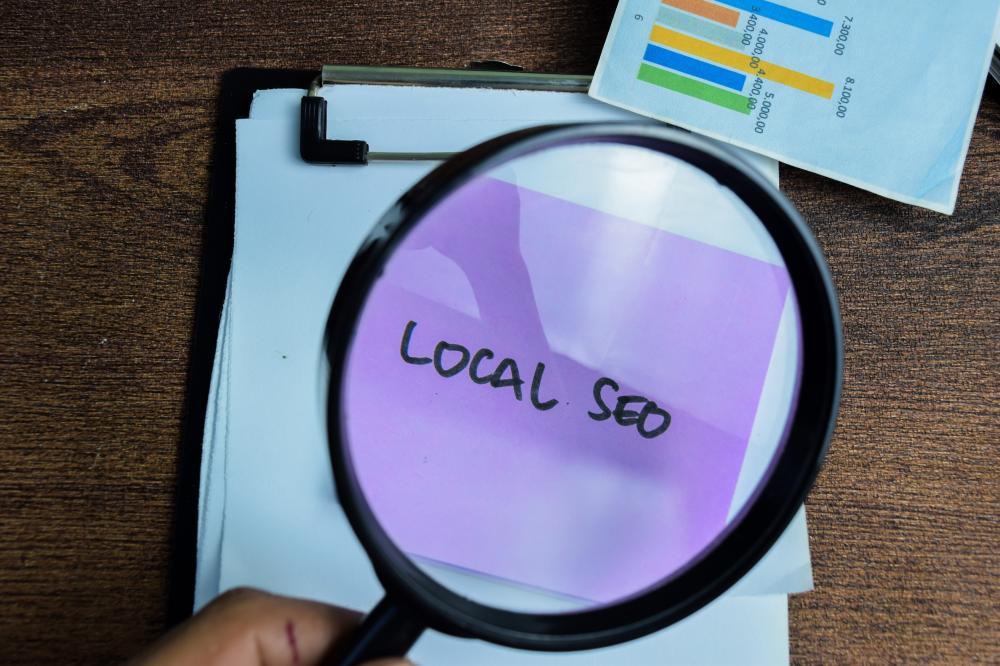- Advanced Local SEO Strategies
- Fundamentals of Local SEO
- Google Business Profile (GBP) Optimization
- Local Keywords and Content Strategy
- Local Link Building
- Local Paid Advertising
- Local Search Ranking Factors
- Local SEO Best Practices
- Local SEO Tools and Analytics
- Local Social Media Marketing
- Online Reviews and Reputation Management
- Technical SEO for Local Businesses
Why Localized SEO is Crucial for Your Business
Localized SEO is like the magic spell for small businesses seeking to charm their local audience. As a professional who’s spent over two decades immersed in SEO strategies, I can vouch for its transformative power. By optimizing your online presence for local search terms, you ensure your business stands out in local search results. This isn’t just about getting traffic–it’s about attracting the right traffic.
Enabling your business to appear in local search scenarios, like the coveted Google 3-pack, means potential customers are more likely to choose your services over competitors. Remember, it’s not just foot traffic or a cozy café we’re talking about; it’s about leveraging geo-targeted keywords to make sure your services are top-of-mind for your community.
Key Elements for Effective Localized SEO
Localized SEO involves several strategic components working in harmony. Here’s a breakdown of the must-haves:
- Google Business Profile Optimization: Ensure your business listing is current, with accurate contact information.
- Localized Content Creation: Craft content that’s relevant and compelling for your community.
- Local Link Building: Partner with local businesses to earn backlinks, boosting your site’s authority.
- Online Reviews Management: Encourage satisfied customers to leave positive reviews and engage with them online.
These elements are the pillars that support a robust localized SEO strategy, each step honing your business’s online visibility and credibility.
Localized SEO in Action: A Mini Case Study
Let me share a story from my treasure trove of experience. A local bakery approached us at SEOLocal.io, struggling to reach beyond their loyal foot traffic. We implemented a comprehensive localized SEO campaign, including content tailored to seasonal offerings and collaborations with nearby businesses.
Within 30 days, they saw a 50% increase in online inquiries, and their Google Business Profile visits skyrocketed. This wasn’t some fluke; it was the precise execution of localized SEO strategies tailored for their unique situation.
What Qualifies as a Localized SEO Emergency?
A localized SEO emergency could arise when a sudden drop in local search rankings occurs, impacting your business visibility. You might notice a decline in foot traffic or online sales. Here are the steps you should take:
- Check for recent changes in local SEO algorithms and adjust your strategy accordingly.
- Review your Google Business Profile for any discrepancies or outdated information.
- Ensure all listings and citations are accurate and consistent across platforms.
- Engage with customers through reviews and local social media to boost visibility.
Addressing these factors promptly can mitigate the impacts, helping restore your local rankings efficiently.
Exploring the Future of Localized SEO
The future of localized SEO looks promising yet challenging with evolving trends like voice search and AI advancements. Voice search, for instance, demands a shift towards more conversational keyword phrases. At SEOLocal.io, we’re already leveraging advanced AI tools to streamline this transition, ensuring businesses maintain a competitive edge.
With the onset of AI-driven insights, businesses can now predict local search patterns and user behaviors with unprecedented accuracy, allowing for preemptive strategy adjustments. For those willing to embrace these innovations, the potential for growth is immense. The localized SEO landscape is ever-changing, and staying ahead requires savvy adaptation and a forward-thinking mindset.

The Importance of SEO Localization
In the realm of search engine optimization, SEO Localization has emerged as a crucial strategy to ensure that content resonates with diverse audiences. As someone who has spent over two decades in the industry, I’ve seen businesses thrive by tailoring their content to meet the cultural and linguistic nuances of their target demographics. This approach does not merely stop at translating keywords; it extends to understanding local search habits and preferences.
SEO Localization involves adapting content so it feels native to local users. For instance, the purchasing behaviors in Tokyo can significantly differ from those in New York. By aligning your SEO efforts with local expectations, your business can increase its online visibility and engagement exponentially.
Why Choose SEO Localization?
The digital marketplace is vast, and to stand out, one must cater to local sensitivities. I’ve observed that businesses embracing SEO Localization often see a substantial rise in organic traffic. By customizing content strategies, SEOLocal.io clients have reported a 30% increase in local search rankings within just weeks. It’s all about connecting authentically with the audience.
Moreover, prioritizing SEO Localization can boost your business’s reputation. There’s an undeniable trust that builds when users see content that acknowledges their cultural context. This trust not only translates to higher website traffic but also enhances customer loyalty.
How to Implement SEO Localization
SEO Localization is a nuanced endeavor. Start by conducting a detailed market analysis. Identify local keywords and search patterns that differ from global trends. Here’s a strategic approach to get started:
- Research and integrate country-specific search terms using AI-powered tools.
- Tailor content to reflect regional experiences and cultural nuances.
- Optimize meta tags and descriptions with local phrases.
- Utilize local social media platforms to enhance content visibility.
By following these steps, your business will be well on its way to mastering SEO Localization. Remember, authenticity and relevance are the keys to winning local markets.
Why Is SEO Localization Crucial for Businesses?
SEO Localization is the cornerstone of a successful digital strategy in today’s globalized world. It’s not just about translating content but making it relevant to the local audience. As someone deeply involved in this field, I’ve seen firsthand how businesses that localize their SEO efforts outperform those who don’t.
The precision of SEOLocal.io’s AI-driven strategies ensures that content is not just visible but resonates deeply with local audiences. With over 150,000 #1 rankings in search engine results, our approach underscores the value of a targeted localization strategy. Simply put, SEO Localization is a game-changer.
- Enhanced audience engagement
- Increased revenue opportunities
- Stronger brand presence in local markets
How Does SEO Localization Differ from Translation?
Translation and SEO Localization are often confused, yet they serve distinct purposes. Translation focuses on converting text from one language to another, while SEO Localization encompasses a broader spectrum. It involves adapting content so that it aligns with the cultural, political, and social contexts of the target audience.
SEO Localization looks at elements like currency formats, measurement units, and even local slang. It’s about building a connection with the audience–going beyond words to encompass the entire user experience. In essence, it’s the difference between speaking the language and truly understanding the local culture.
The Localization SEO Revolution
Localization SEO is reshaping the digital landscape by tailoring search engine strategies to meet local demands. Businesses aiming to connect with local audiences no longer rely solely on generic SEO tactics. Instead, they are embracing Localization SEO to enhance visibility in specific geographic areas, a tactic that has proven indispensable for businesses aiming to dominate their local markets. At SEOLocal.io, an innovative approach to Localization SEO enables us to leverage AI-driven precision optimization, transforming the way businesses engage with their local audience.
When I began working in the SEO industry over two decades ago, localized strategies were merely an afterthought, whimsically patched onto broader campaigns. Now, personalization in search strategies through Localization SEO is paramount, offering businesses the opportunity to grow and connect with customers on a deeper level. This shift not only improves rankings but also enriches the user experience by delivering content that resonates culturally and geographically.
For example, a local bakery using localized keywords and optimizing their Google Business Profile can effectively attract customers searching for pastries “near me.” At SEOLocal.io, our AI tools streamline such processes, ensuring content is both accurately localized and engaging. By utilizing these AI advancements, businesses can see tangible results, like those reported by our 50,000+ satisfied clients worldwide.
How Does Localization SEO Work?
Localization SEO focuses on incorporating geographical indicators and culturally relevant keywords to optimize content for local audiences. Essentially, it means adapting SEO strategies to serve users in specific areas, which includes modifying keywords, optimizing local listings, and tailoring content to meet the linguistic and cultural preferences of local users.
Steps to implement effective Localization SEO typically include:
- Conduct Local Keyword Research: Identify keywords that potential local customers are likely to use.
- Optimize Google My Business: Ensure business information is accurate and complete.
- Create Localized Content: Develop content that speaks to the local culture and interests.
- Engage in Local Link Building: Collaborate with local businesses for link exchanges.
By taking these steps, businesses can significantly improve their local search visibility. At SEOLocal.io, we utilize AI to refine these steps further, ensuring that each client receives a tailor-made Localization SEO strategy. The uniqueness of our approach lies in our ability to analyze large sets of data swiftly, giving businesses the competitive edge required to thrive in local markets.
Overcoming Common Localization SEO Challenges
Implementing Localization SEO comes with its set of challenges, particularly related to maintaining consistency across various platforms and ensuring content is culturally relevant. One frequent issue businesses face is keeping up with the constant changes in local search trends and algorithm updates.
Another notable challenge is the difficulty in achieving accuracy in geo-targeting, especially for businesses operating in regions with multiple linguistic and cultural influences. This is where platforms like SEOLocal.io make a difference; our AI-driven tools are designed to adapt and respond to these changes in real time, offering bespoke solutions that cater to evolving local demands.
The importance of building a solid online reputation cannot be overstated. Gathering and managing customer reviews effectively can be daunting; however, it’s crucial for positive local SEO outcomes. Businesses need to engage actively with their local audience, using feedback to improve services and demonstrate commitment to quality, thereby building trust and boosting local rankings.
In my extensive experience, I’ve seen how harnessing AI for these tasks can streamline processes, reduce costs, and improve accuracy. SEOLocal.io’s commitment to innovation means that clients don’t just keep pace with changes; they stay ahead of the curve, transforming localized challenges into opportunities for growth.
What is the Future of Localization SEO?
The future of Localization SEO is set to be heavily influenced by advancements in AI and machine learning technologies. These technologies enable businesses to anticipate local market trends and adapt their strategies dynamically, ensuring continued relevance and engagement. At SEOLocal.io, we’re constantly exploring these innovations, integrating them into our offerings to provide clients with the most effective and cutting-edge solutions.
One emerging trend is the incorporation of voice search technology, which requires businesses to rethink how localization is approached. Voice searches are typically longer and more conversational, hence Localization SEO strategies must evolve to include these nuances. It’s an exciting frontier that presents new opportunities for businesses willing to adapt.
As we move forward, ethical considerations in Localization SEO will also come to the forefront. Transparently managing data and respecting user privacy will become paramount in building trust and maintaining a positive business reputation. SEOLocal.io is committed to these ethical practices, setting a standard for responsible SEO strategies in the industry.

What is localization in SEO?
Localization in SEO is the practice of tailoring your search engine optimization strategies to meet the specific needs of your local audience. Imagine you own a boutique coffee shop in Paris. Localization means adjusting your content to reflect the culture and language of your French customers, optimizing your site to include French keywords or slang, and ensuring your business is listed on local directories. It’s not just about translating your website but involves a deeper understanding of local trends and behaviors. By adopting this practice, you can connect more personally with your audience, increase visibility, and become a trusted part of your community.
What is a local SEO?
Local SEO is an approach focused on optimizing your online presence for a specific geographic location. Imagine you’re running a Mexican restaurant in downtown Los Angeles. Your goal with local SEO is to appear in searches like “tacos near me” or “best Mexican restaurant in LA.” This involves optimizing your Google Business Profile, gaining quality local backlinks, and encouraging customer reviews. At SEOLocal.io, we see local SEO as a way to make sure your business not only appears in local search results but stands out as the go-to option for local customers.
What is the difference between local SEO and regular SEO?
Local SEO and regular SEO serve different purposes and audiences. While regular SEO aims at improving your website’s visibility on a global scale, local SEO hones in on connecting with customers within a specific region. For instance, a global clothing brand might focus on general SEO to increase its reach worldwide, optimizing for diverse keywords and backlinks. In contrast, a local boutique would prioritize local SEO efforts, targeting city-specific keywords and leveraging local reviews. At SEOLocal.io, we know that combining both strategies can maximize your reach and ensure you’re capturing the attention of both local and broader audiences.
Does local SEO still work?
Absolutely, local SEO is more relevant than ever! With the rise in mobile searches and location-based queries, local SEO has become crucial for businesses wanting to connect with their immediate audience. For example, if you’re managing a pet grooming service, local SEO helps ensure that when someone nearby searches for “pet grooming services,” your business appears as a top result. At SEOLocal.io, we’ve seen firsthand how effective local SEO can lead to increased foot traffic and online conversions, tailoring our strategies to make sure businesses stay ahead of local search trends.
How can businesses effectively implement Localized SEO?
Implementing Localized SEO involves a combination of strategies aimed at boosting your visibility within a specific area. Start by optimizing your Google Business Profile with accurate and detailed information. Create content that resonates with the local culture, such as blog posts about community events or local partnerships. Utilize local keywords relevant to your industry, and engage with local influencers to broaden your reach. At SEOLocal.io, we advise taking advantage of AI tools to analyze local search trends and adjust your strategies dynamically. By focusing on these areas, businesses can enhance their local presence and foster stronger community connections.
How does Localization SEO differ from translation?
Localization SEO goes beyond simple translation. While translation converts text from one language to another, Localization SEO involves adapting content to align with local cultural and linguistic nuances. Suppose you have a restaurant in Tokyo. Translation would involve converting your menu to Japanese. However, Localization SEO would also consider local dining customs, popular local dishes, and even local search habits. At SEOLocal.io, we focus on ensuring that content not only speaks the language but also resonates with the lifestyle and preferences of the local audience, creating a more authentic connection.
What challenges do businesses face with Localization SEO?
Businesses often encounter challenges such as keeping up with ever-changing local search algorithms and ensuring consistent branding across various platforms. A common issue is effectively geo-targeting, especially in regions with diverse linguistic backgrounds. There’s also the challenge of maintaining cultural sensitivity in content. At SEOLocal.io, we tackle these hurdles by leveraging AI-driven tools that provide real-time insights into local trends and changes. This allows businesses to quickly adapt and sustain their local SEO efforts. Engaging with your audience through reviews and social media can also help build trust and reinforce your local presence.
What is the future of Localization SEO?
The future of Localization SEO is set to be shaped by advancements in AI and voice search technology. As more consumers use voice search, businesses must adapt their strategies to incorporate conversational keywords. Additionally, AI tools are evolving to predict local search patterns with greater accuracy, enabling more precise targeting. Ethical considerations such as data privacy will also become crucial. At SEOLocal.io, we’re at the forefront of these developments, integrating cutting-edge solutions to provide our clients with a competitive edge. Embracing these innovations will be key for businesses aiming to maintain robust local engagement and visibility.
Resources
- Search Engine Journal – A trusted source for the latest news and trends in the SEO industry.
- Search Engine Land – An authoritative publication covering all aspects of search engine marketing.
- Moz – A leading SEO software provider offering valuable insights and tools for optimizing websites.
- Ahrefs – A comprehensive SEO toolset for keyword research, backlink analysis, and competitor analysis.
- American Marketing Association – A professional association for marketers providing resources and insights on marketing strategies.
SEOLocal.it.com 

Rated 4.9/5 based on 258 customer reviews



